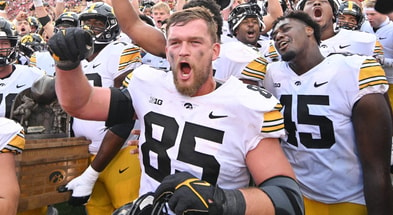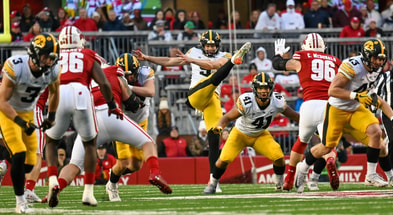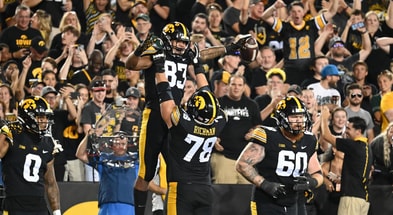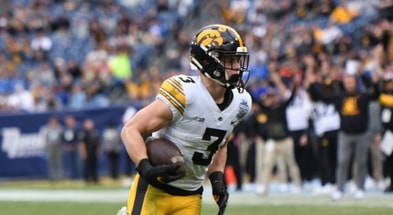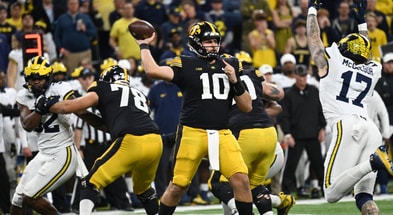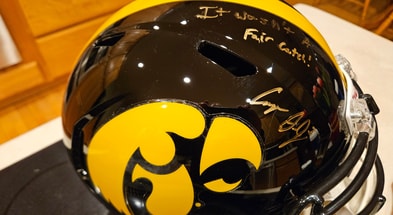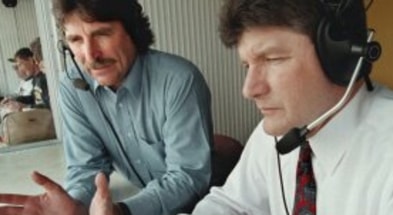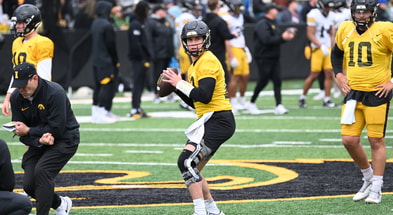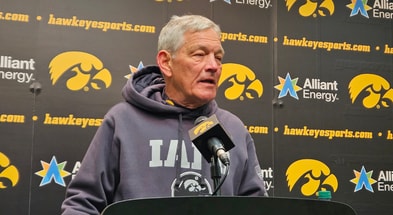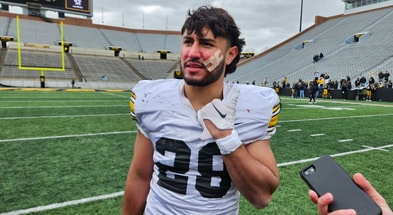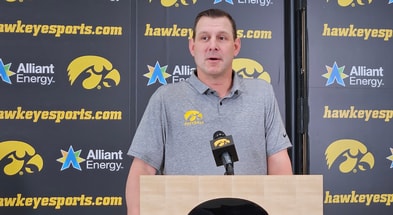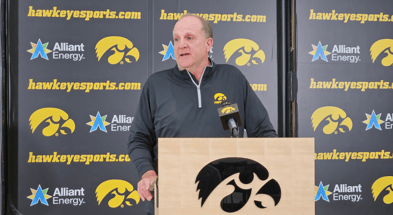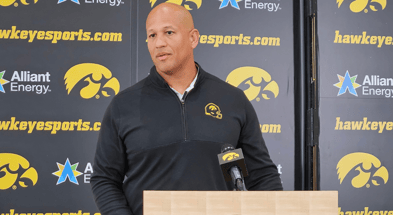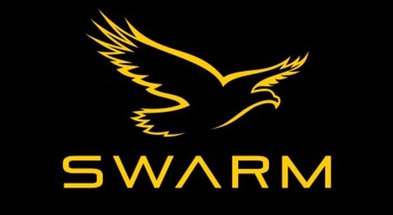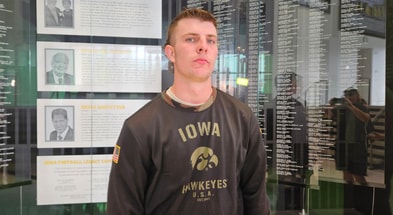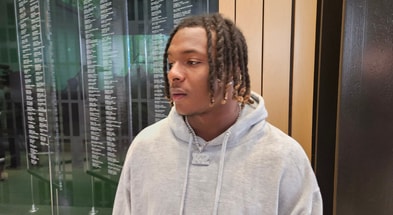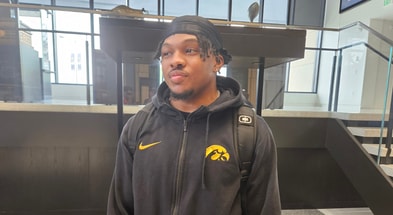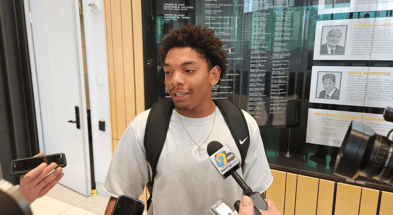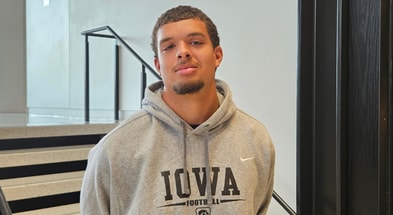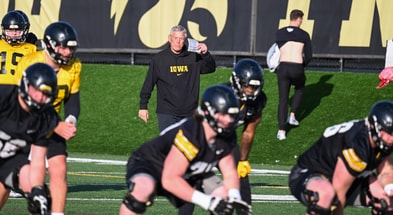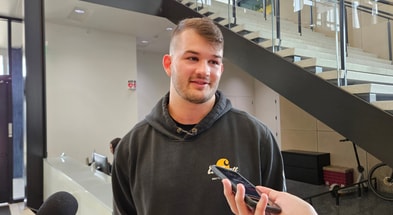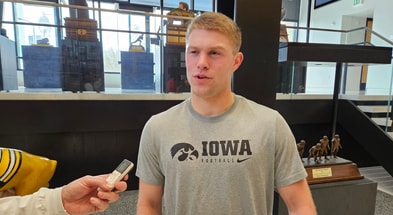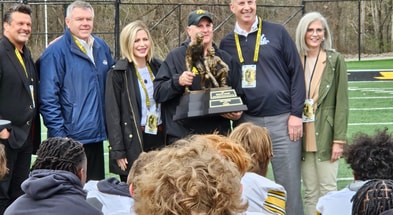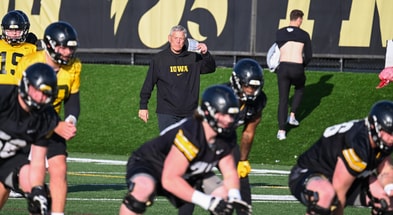Kirk Ferentz talks Iowa Spring Football
The Iowa football program opened spring practices last week in Iowa City. On Tuesday, Hawkeye head coach Kirk Ferentz spoke to the media about his new look team with a different offensive coordinator and updated everyone on how that transition has gone thus far. He also talks about the departure of Kadyn Proctor, the transfer portal, and the Iowa Swarm.
KIRK FERENTZ: Good to see everybody. It has been a while. Everybody here has been busy covering a lot of good success stories. We’ve been quiet for a while, too, which isn’t all bad.
First of all, I want to congratulate Coach Bluder and the entire staff, her program, her team. It’s been so much fun to watch them. Really had to fight hard last night to get that victory. Really happy for them as they move on and wish them the best certainly moving forward.
I think they have captivated a lot of hearts and minds along the way.
We started the second week of spring practice this morning, had our fourth workout. Like always, it’s good to get started, and it’s an important time not only for the players but also for the coaches. It is a real opportunity for everybody.
Basically the winter program runs about eight weeks after the guys get back, a chance to work on their physical and mental development, and then during that same period the coaches are finishing up recruiting and then working on the system.
We transition after Spring Break into spring practice, and it’s a good opportunity for us to get on the field. And the thing I’ve always enjoyed about it, it’s a deliberate teaching time. There’s no pressure of getting ready for a ballgame on Saturday or at any point during the spring we’re not trying to get our team game ready, we’re just trying to watch the guys and see how they’re developing, how they’re improving and how much they can retain handling new situations, those types of things.
To me it’s all about growth and development. That’s been our approach each and every year.
Every year we talk about when we get back together in January, it’s a new year calendar-wise, a new team, regardless of how many players you have back or don’t. It’s going to be a different team and you really kind of start from scratch.
As you transition before and out of spring practice, you only have 15 opportunities to putting helmets on; three of those are without pads, but 15 with helmets, and that’ll be it until we get going in camp.
The best way to practice football is to practice football with helmets on, obviously, and if there are some things we can do in this period that you can’t do in the out of season, the summer, that type of deal.
Basically what I’m saying is every opportunity is really important, and hopefully our players understand that, and I think they get that.
Again, it is all about growth. You hear people talk about the game slowing down. Really that’s a result of seeing things better and being able to do things better. Those are the things you can only do when you’re out on the field practicing.
Then the meeting time is every bit as valuable as the practice time, and fortunately in the spring you have a good opportunity for good meeting time, quality meeting time more so than in season, if that makes any sense.
So it’s a real opportunity for players if they’re paying attention to grow forward or move forward and grow as players.
Just in general terms if you look at right now, special teams, obviously we need a new punter. We have a new punter and a punting competition, and we’ll see how that goes during the course of the spring.
Also we’re looking at all positions basically to see who the core guys are going to be, returners, that type of deal.
Defensively we’re fairly veteran and certainly will make some tweaks, but our system, we’ve had a system that’s been in place pretty much for 25 years, so that’s a little different scenario than offense where obviously we’re going through basically everything is new, new language, and everything about it is new.
There’s a lot of new teaching going on there, new learning from everybody, for everybody.
That kind of reflects our team in some ways, too. We have a group that’s veteran in some areas, some respects, maybe more veteran than we’ve been; sixth-year guys. The COVID thing changed dynamics a little bit.
And then the flipside is we have a lot of guys who haven’t played much. Kind of two tiers if you think about guys that have been in the program but been behind some pretty good players. I think about a guy like Jaden Harrell, middle linebacker behind Jack Campbell and now Jay Higgins; good quality work.
And then we have a lot of young guys, first-year guys and even second-year guys. Real good opportunity for these guys to get quality work and get a good look at them, as well.
Then a couple of things before I open it up for questions, just a couple comments about the transfer portal and then NIL, big topics, obviously, in what we’re doing. I think about the transfer portal, I think in general terms it’s been good for us. I had to go back to adding a player like Jack Heflin several years or Zach VanValkenburg; Mekhi Sargent came from Iowa Western, but nonetheless a new player coming in who added a lot to our team and ended up being a team captain.
You think about last year with guys like Nick Jackson, Rusty Feth, maybe not headline players yet really good players and very impactful players. Nick became a headline player in some ways; Rusty and lineman Cade, Erick, so we’ve benefitted in that way, and we’ll continue to look in that regard.
Then I think as most of you know, we had a player join us back in January that had a change of heart after spring break, and as I said a week ago, I think the bottom line there is that you don’t want a player in the program that doesn’t want to be here.
That’s always kind of been our feeling, and in my mind at least it’s best for both parties to go separate ways at that point.
But that’s part of the transfer portal, and we haven’t dealt with a lot of that, but certainly came up last week.
NIL, I think that’s overall been positive in a lot of ways. It’s been positive for our guys and I think positive for a lot of college athletes. It’s kind of interesting if you look at it going back, I remember in the ’80s it was a big deal to get TV exposure.
If ABC or CBS came in to do a game, that was a big deal. That world has kind of transitioned a little bit. It seemed like facilities became a real big thing, and now NIL is starting to surface a little bit and become more impactful.
I think it’s fair to say that having a good NIL program is a key differentiator in both recruiting and maybe more importantly retention. That’s probably where our focus is a little bit more.
Really feel fortunate in a lot of ways that we have a strong presence with this SWARM Collective. It’s a volunteer effort, and it’s basically been supported by supporters, donors and fans. Very appreciative of that.
But the bottom line is it’s not going away. It is part of college athletics now, at least in the immediate future, and I don’t see that changing much. I think in some ways we’re healthy but certainly the combination of both, it’s interesting, and probably not something that’s working very well, and I think right now the bottom line is we have a flawed system, and probably like a lot of people, obviously it would be great to get to a point where we can have a system put in place that’s going to be sustainable.
I’m not sure I have any answers on that equation, but it’s certainly something to keep an eye on as we move forward.
All in all, it’s good to be started here. It’s good to be back on the field. I’ll throw it out for questions and see where we go.
Q. I wanted to ask you regarding the portal, the player who chose to leave, I guess first is were you surprised that he left? Second, is there anything that can be done in the short term about situations like this where you bring somebody in for two months and they’re gone and they do what they do?
KIRK FERENTZ: Yeah, surprised, no. Somewhere in the first year, my first year being a head coach at the University of Maine, I can’t remember what happened exactly, but I told my wife say, I went home that night and said if I am ever come home and say I’m surprised by anything, just hit me with a baseball bat.
I try not to get too surprised by anything.
It’s probably a reflection of the system frankly and where we’re at right now. As you know, a couple lawsuits have come into play when it comes to the transfer portal and also NIL, so probably the biggest concern of this whole thing is just learning boundaries.
There’s no structure, no frame work, and that part makes it interesting in the fact that I don’t know if it is sustainable.
So at some point we’re going to have to be able to have a framework and a mode of operation. It’s just part of the business, I guess, and fortunately we haven’t experienced too many of those types of things.
But again, at the end of the day, whenever it happens, if it does happen, you don’t want a player in the program that doesn’t want to be here. If his heart and soul is not into it, it’s not good for him, it’s not good for us, either. We’re his teammates so I think that’s kind of the bottom line.
If there’s a silver lining here, too, we didn’t spend any practice reps with someone who had no intention of being here, and that’s a positive, as well.
Q. Dovetailing off that, do you happen to know if Kadyn is still enrolled? I’ve never heard of a case like this where guys do it at this point in the season, where they are right now.
KIRK FERENTZ: Yeah, it’s probably a byproduct of that (freedom) lawsuit. I assume he’s going to finish out the semester and then go from there, but I’m not sure about his whereabouts right now.
Q. You are the longest tenured coach, so what you say matters throughout the country. I wonder, is it worth wasting any time in considering if a year from now or pretty quickly there’s going to be revenue sharing, players may be paid, how that impacts the locker room or not? Have you given that a thought?
KIRK FERENTZ: Yeah, sure. I think we’ve already given that thought because NIL has created that. There’s been a whole lot of things that came with NIL that was really interesting to consider. I think the locker rooms first and foremost for us.
Our approach has been to try to make it a fairly even-tiered thing, if you will, and — I don’t know how the right word to say this — but try to make sure everybody has an opportunity to be rewarded through the system, if you will.
We’ve tried to do that in a way that we think would be fair, in a way that the players more importantly they think would be fair, and I think the fact we had eight guys come back this out of season choose to come back, I think it was probably a pretty good reflection that we hit it right this year.
But I think it’s also going to be a moving target.
The one thing I will say, I spent six years in the NFL. It’s funny, Charlie Bullen was back here this morning; just took a job with the Giants and we were talking about the difference of the college football versus NFL. At least when you sign a contract, you sign a contract, coaches and players, and you’re there or you don’t work. It’s one or the other.
I don’t know how we get there in college football or college athletics, but it would be nice to have some clarity and already know, hey, this is what it’s going to be this year, and then the next year is new, a new circumstance.
Q. This is the first time since 2012 you’ve got an outside guy coming in to be your offensive coordinator. I realize this is somewhat limited foreign turf for you, so how does the process go installing what you want to do on offense? Do you have a full plan yet? Are you developing that plan as spring goes on? Where are you in the Tim Lester era here?
KIRK FERENTZ: Yeah, so when Greg came it was a cooperative effort. We all sat down and visited, we being the offensive coaches, and I sat in the meetings, too, but we just kind of worked through it and in a nutshell basically with Greg. We kept a lot of the passing terminology that he was familiar with. We kept that. Then some of the systematic stuff and some of the running game stuff we kept in our language.
So there’s a mixture there. But that was his decision basically. He was comfortable with that.
I think the bottom line is the guy who’s going to call the plays has to be really comfortable with what the terminology is going to be because it has to come out, it’s got to come out pretty quick and naturally.
Whether it was Tim or whomever we hired this year, it was going to be the same thing, same discussion, and basically we’re just taking his playbook material and going with it.
It’s been a process, though. We’re trying to install something each and every day. It’s been challenging, I think, for everybody, and myself included, just learning the language and all that type of thing and trying to keep up.
We’re doing that and seeing how the install is going and then also see how the players are handling that, and where it all ends up we’ll see at the end of spring, and certainly we’ll work through some of that in August, too. So far it’s been good. It’s good.
Q. You opened the presser talking about Lisa Bluder and the women’s team. I was curious, you don’t get to watch a ton of NFL football or baseball during baseball season. Have you gotten a chance to watch Caitlin Clark play? Any general thoughts on her?
KIRK FERENTZ: She’s obviously an awesome player. I don’t know where to start. Her impact basketball-wise, and I’m certainly not a basketball expert, but it’s pretty obvious. I think the things that maybe impressed me more than anything is her vision. She has great vision. Her passing ability. If you’re a teammate you’d better be paying attention. They know that better than I do. Because if they’re open, yeah, it’s unbelievable.
She threaded the needle two weekends ago, there was one — she has a million assists that are really good — she got one right down from out on top around the foul line. I don’t know how she got it in there. So she’s been impressive that way, just her presence, her demeanor, the way she handles tough situations, whether it’s postgame press conferences, whatever.
The other thing I’m just fascinated by is just the attention that it’s brought to women’s basketball, not just our program, the University of Iowa program, but women’s basketball.
I don’t know if there’s been an athlete that’s had that kind of impact. You go on the road and every crowd is a sellout.
Maybe that’s happened in other sports where — that dramatic of an impact, but I think it just speaks really well to her as a player, but more importantly the way she’s handled it because I don’t know how old she is, 21, 22, and it’s a lot to ask. It’s been impressive to watch her.
Q. Regarding Tim and bringing him in as your new offensive coordinator, how are things going person-to-person-wise, plug and go? What does that look like with having a new member of your staff that doesn’t happen all that frequently?
KIRK FERENTZ: Fortunately we haven’t had a lot of change or turnover. But when we’ve had it, it’s all been pretty good. We’ve brought a lot of really good people in here. Probably a bigger adjustment for him since there’s more of us that were here. He’s the new guy, if you will, that way.
But Tim is a great guy, great person. He’s a veteran coach and been in a lot of different situations, a lot of different levels. He’s handling it really, really well and has done a great job with the players, as well.
I don’t want to speak for him, but I think the transition is going really smoothly and thus far very, very positive, so not surprised.
Q. There’s a clear one, two, three on the quarterback depth chart in the spring practice depth chart here. What are some of your development goals for each of those three guys since they’re coming in in really sort of different spots in their career?
KIRK FERENTZ: Yeah, it’s pretty simple. We want them all to improve. They all need to, and they all know that. That’s every player on the team, though.
I’ll start with our oldest guys, the guys on defense. If they’re not thinking that way, we’re not going to have a good team next year. Everybody needs to be thinking about that, and what improvement looks like is different for every player, certainly, but quarterback is a pretty prominent position, and Deacon has the benefit of he played the most last year of any of our guys, so certainly he’s got more experience, but an awful lot of things he can work on.
Marco has got a different set of circumstances and different things to work on, but every player on the team has got things they need to get better at. That’s what this time period is really good. It gives us a chance to articulate those things, show them on film, and then hopefully put them in situations where they can demonstrate that they are learning and improving. That’s a whole deal.
Then the faster you can do it, the better off.
The depth chart, I’ll just say a word about that. It’s March 26th right now, so it doesn’t mean a lot, and I told the players that in the first meeting. Nobody knows what it’s going to look like on August 31st, so right now let’s just worry about getting better and worry about your performance.
Q. Obviously the portal isn’t open right now, but it will reopen. Have you given thought, are you guys going to potentially add one or two or however many in the portal? Where do you stand right now with that?
KIRK FERENTZ: Sure, we’ll know more about our team at the end of spring and then — I mean, we’re always going to look at it and always consider, and if there’s a glaring weakness or a place we think we can make our team better, absolutely. Some of the guys I’ve mentioned that have come here have really helped our team become better.
But just in general terms, our goal is to really continue to grow through — develop our team, recruit our team, and then develop them. That’s why this period is so important right now.
I mean, it’s just an important time for us. We’ll continue to look. But it’s like the NFL, I think you’re better off trying to draft your own players and develop your own players; trick there is keeping them because of the salary cap, all that type of deal.
But yeah, we’re a better football team. Most of our guys are growing here, I think, in the program.
Q. Cade with his injury recovery, how involved can he be this spring? Also, any update on medical scholarships or guys who aren’t continuing their football career at this point?
KIRK FERENTZ: Yeah, nothing on that ladder at this point. We have a couple guys still working their way back, so we’ll see how that goes, and it’s probably going to be a couple months for a couple guys.
But as far as Cade goes, he’ll limited right now. He can throw the football standing, but he can’t be really moving back, moving around or dropping, that type of deal.
I have a harness on him because he’s always anxious to do a little bit more than what he probably should. What we don’t want to do is go backwards, but I would like to think in June he will be full speed so do everything and then have a couple months to get used to operating and get comfortable and confident again.
Q. This is the first time there aren’t divisions in 15 years or whatever. You’re going to be playing a lot of teams you only played sporadically and now you’re going to have four new teams coming in, two of which you play. How has that impacted some of your offseason looks? And because you have a new offensive staff has that limited your ability to take a look at Washington or UCLA who maybe in the past you would have scouted at least to this point.
KIRK FERENTZ: Ironically, they both have new staffs, too, new staffs on both schools we’re playing from the West Coast. That’s one of the hard things in out-of-season preparation anyway. You can always track DNA, go back to the schools the coordinators came from, which we’re not at that point yet, but we’ll do some of that after spring ball is over with.
All that talk, and I’ve sat through a lot of meetings. We argue about schedules, how to break up divisions and all that. I think it was a year ago January or February, we just had one in Chicago. We were there a day and a half talking about schedules and all that, and then we added two teams a month later or two months later, so take all that stuff and tear it up. What a waste of time that was.
To me you’re going to play 12 games and you line them up and that’s what you do is play those teams.
I think probably the biggest factor moving to four is the travel part of it, and if we only have one West Coast trip a year, that’s not major, and this year fortunately, we have a West Coast and then a bye week coming back. It’s not so much going out, it’s the coming back part that can get a little tricky and kind of throw you out of kilter for the next couple days.
Q. One more Tim Lester question. Philosophically any coordinator is not going to call plays or a series of plays the head coach doesn’t sign off on. The way you guys play and the way you guys win, is it going to be demonstrably different?
KIRK FERENTZ: Yeah, I think it’s going to look different, but I think philosophically we’re in line. Not that it was a prerequisite, but he’s been a head coach, and I think he understands how all three things function together.
We played good defense here pretty much 20-plus years. That was a building block coming in.
But playing complementary football and not being reckless with the football is a big part of that and being good on special teams. That’s been a big part of our blueprint, I guess, and if you coach offense sometimes you may pay a price because maybe we’re not going to throw it out there when we’re just trying to win the game the last quarter, play it smartly that way.
Stats are great and all that, but the most important stat is winning games, and that has been first and foremost. And my visits with Tim, I think that’s where he’s at, too. He thinks the same way and he gets it. He gets how things work together.
Q. Was it key that he was a head coach?
KIRK FERENTZ: It helped but it wasn’t a requisite. It was not a requisite. It certainly didn’t hurt.
I’m as impressed with what he did at the Division III level. In fact one of his former players was here today at practice. He’s coached at all levels and done a lot of things. I think having that kind of background makes you a better coach.
Probably needing a little better understanding of everything, just life in general.
Q. I wanted to ask about D-line. Solid four guys who have a lot of experience, but how are you viewing the depth and what do you need to see this spring from some of those guys that might be emerging?
KIRK FERENTZ: Yeah, as I mentioned here, the thing about a guy like Max Llewellyn who hasn’t played a lot, but we’ve seen him growing behind the scenes, if you will. He’s getting a lot of good work in right now. We’re feeling pretty good about Deontae and Ethan. They have gotten a lot of work. We’re getting a lot of work behind them some work guy like Max or a guy like Brian Allen. Pittman is getting a lot of good work in there; Aaron is still a young guy.
You know, this was really a good time. It’s a matter of these guys taking the steps they need to take and continuing to grow, but it’s been pretty steady through their careers, and this is a really good opportunity for them right now to keep moving forward.
Q. I want to go back to something you said earlier with contracts in the NFL. I totally understand you would much rather be coaching football than be the hypothetical commissioner of college football, but have you given any credence to the idea of contracts or unions with college football and with players?
KIRK FERENTZ: You would need a team of lawyers to probably answer the question. It seems like everything that happens has legal ramifications to it. I don’t know what the answer is. I guess I’m just drawing the analogy or the parallel.
The thing was easy at least in the National Football League is a player signs a contract and he’s there for the year. He has the option of not playing, but if he’s under contract, if he plays — you can argue about that, too, but at least there’s a lot of clarity.
Again, I’m not against the transfer portal. I’m not against NIL by any stretch. I think my initial fear with NIL going back to whenever it started getting talked about and started picking up some traction, I’m old enough to remember — I think it was Nebraska or Army. I can’t tell you what year, I think it was ’72 or ’73; they beat them 77-7 or 77-0 and it was unpatriotic and really not a game where — neither team really benefitted from it.
To me if you start getting into that, then the risk of football drifting back to haves and have-nots increases a little bit if it’s strictly on pocketbooks.
Hopefully we won’t get to that point, but that’s one of the potential byproducts of it.
Q. You didn’t say the key phrase – pay for play.
KIRK FERENTZ: Well, that’s kind of what NIL tends to be it seems like. At least it’s going in that direction. I’m not sure what pay for play means, but if you offer a guy a really good package — it’s kind of like the NFL. We thought we had a chance to get Reggie White. His wife was from Cleveland. He ended up in Green Bay.
It wasn’t because of the facilities. It was a better contract. I think there’s probably some of that going on certainly in what we’re doing. It’s probably naïve to think that that’s not the case.
Q. The loss of Proctor, what does that do for your offensive line? I realize you have Richman back, you have Dunker back. Do you need to groom more tackles here just with the injury situations you’ve had? Part two is I’ve kind of heard murmurings that you might be phasing out the fullback. Are you still going to have a fullback?
KIRK FERENTZ: Yeah, we still have a fullback. A couple of them actually. Hayden Large is working both positions, tight end and fullback, but Rusty — Eli Miller is back after his knee injury and he’s still playing fullback.
The player you spoke of we never had. It’s not like he ever played or took a rep for us. It wasn’t intentional he came here; just it worked out that way back in January.
You can’t count on anything basically until guys get out there. That’s kind of the way it goes. We’re always going to be trying to develop tackles. It’s a tough position to develop. We’re working hard on that right now. I think we have three guys with veteran experience that can do a good job out there, and that’s a positive, but that’s not enough.
Two of them are going to be gone after this coming year. We always need to keep that moving forward.
Q. To go a little bit off the offensive line question, you have seven guys coming back this last year that had starting experience. I know going into last season we talked a lot about the growth in terms of maturity of the guys up there. Is there anything that you’re seeing or that you want to see to take them to that next level of maybe being a little bit more consistent this year?
KIRK FERENTZ: There has been a lot of talk about our offensive production, and quite frankly — I still go back and look at film. Execution, and then part of that’s been we haven’t been as good up front as we’ve been in years past.
Typically we’ve been pretty good on defense, try to be good on special teams, and historically our better teams have been pretty good up front. It’s nobody’s fault. There’s no finger pointing. It’s nobody’s fault that we’ve had injuries.
We’ve had a recruiting class or two where we’ve had some things work out not in a way we had hoped or maybe would have planned, so all of a sudden you’re a little deficient, and then that’s showing up. It’s tough to separate offensively within most systems if you don’t block as well as you like.
The good news is I think we are more veteran. It’s not like there’s any pixie dust we can sprinkle on those guys last year or the year before. In some cases we’ve had guys playing probably before they maybe were ready, fully ready to play at a high level. I think the good news is right now we have an opportunity maybe to develop into a good line because we do have pretty good experience. I think we have good leadership in there, too, and that’s paramount to any group, any team.
I think those guys are shaping up, and it’s just a matter of taking the steps in front of them and just keep working. The guys that are out there right now are working hard and doing a good job so far.
Q. As a head coach, how do you navigate change? It seems like the offense is changing, portal is changing, recruitment is changing. How do you as a head coach navigate it all?
KIRK FERENTZ: It’s just life. Life changes. It keeps it interesting for sure, to start with.
You know, you just try to rely on the people that you are with every day basically. There’s a lot of things I — I’ve joked about it, but if it’s on social media I don’t know how to get there because I don’t live in that world.
But fortunately I have people that keep me apprised of things I need to be apprised of. I hope they do. It’s that way in every area.
Probably the biggest change is our staff has grown now because we never had social media staff before. You have to now. The recruiting staff has grown because we have visitors all the time. It’s just kind of a natural process, if you will.
Then you make decisions along the way about how many people do we need in our recruiting department or our social media department. I’d rather go less than more typically, but it’s about relying on all the people you have. There’s a lot of teamwork that goes on in this whole operation.
I’ll go back to the first game I coached. One of my friends I taught school, John Bridge, was here. He was amazed how many people were involved in just the gameday operation.
I said, yeah — he was a basketball guy, so he was used to smaller groups. You have 100 plus players, there’s going to be a lot of people involved, and now those numbers have really grown since then as far as support staff.
It’s just relying on everybody and trying to have good communication and getting everybody’s ideas on what do you think we need to be doing, what are we missing, how can we improve, and still keep it in the framework of the way we want to do things, not just be like everybody else.
Q. You guys were able to retain a lot of guys on defense. What was it like for you to watch the process of a bunch of starters come back, and are there any favorite moments you can share of guys telling you they’re coming back or anything like that?
KIRK FERENTZ: I mean, every one of the guys that said they were coming back was a good moment. Just like when guys leave, you hate to see it — you have mixed emotions. Selfishly, all of us would love to have Cooper back, but he felt it was a decision that was best for him, so totally get that and totally support him.
I’ll go back a couple years ago when we had a little break and both LaPorta and Campbell walked in my office within a half hour of each other. They had come back from that from that break and thought about it and said, hey, we’re coming back for our senior years. That’s always a good thing. You want to keep good players around, but you don’t want to do it again if it’s not what’s best for them.
They have to make that decision. That’s not our decision to make for them. But getting all the guys back was great.
I think some momentum. Once a couple guys decided they were going to do it, we built some momentum that way. I think these guys feel a brotherhood or whatever. There’s teamwork, there’s a team aspect where they all kind of want to keep going here and keep playing, see what they can do.
Q. Going back to the offensive line, that guard spot that Rusty, his graduation leaves open, what’s your thought process there? When you’re saying the three tackles, I assume that means you want to keep Nick on the outside or where do you stand there?
KIRK FERENTZ: No, not necessarily. Just that Nick can play out there, so we don’t envision moving Dunker in there at all, and I don’t envision moving Mason in. It’ll probably be our tackle spots.
Then everybody else is competing, so it may be Nick, it might be Elsbury. I don’t know. Logan is out right now with a surgery repair, so he’s rehabbing. So Tyler is working more at center position.
It’s going to be the five best guys will be the five guys out there, and we’ll figure out the equation, whether that works, how they are going to line up, and just let the guys compete.
Again, it’s March right now, so who knows what it’s going to look like in August. But bigger pool of experienced guys that hopefully ae more confident. I think they will be more confident and more proficient at what they’re doing.
Q. I wanted to ask about Cade, how much he’s been able to work now, and then how do you see him fitting in an offense like this where I think he has some RPO experiences. I think he did at Michigan when he was there. How does he fit into this type of an offensive skill set?
KIRK FERENTZ: Yeah, I don’t see it being a major transition for him at all. He can’t really do much physically right now other than throw a ball, just stand and throw. They don’t want him running around or doing any sudden movements.
But he’s throwing the ball just fine. That’s not an issue. Then the good thing is he has game experience and positive game experience. He’s played well when he’s healthy, and unfortunately we never really saw him at full speed last year.
I’m eager to see him when he can move and be mobile and adjust and do some things, but mentally he’s right there in the muddle with the guys. He’s relaying calls to his teammates that aren’t in the huddle, that type of thing. He’s 100 percent involved in it and engrossed in it.
It’ll be good to get him back because he’s got good experience, and that’s the positive. It creates a good window for the other guys to have more reps, more quality reps and see what they can do, too. Really interested in all the positions on our team but really curious to see how the two guys competing right now look at the end of spring ball.
Q. I wanted to get your reaction to this hip drop rule in the NFL, if you’ve even heard of it or what the impact could be.
KIRK FERENTZ: I said last night I was going to Google it and look at it, but I didn’t do it, so I apologize. But it’s interesting. I’ve heard a lot of talk about it, and then going home last night, it was on the radio and they were talking about it on the NFL Network. Sounds like it’s about once a game. Those are the numbers I got and the injury rate is high.
I’m not sure I know exactly what it looks like. The horse collar, they referenced that a couple years ago, and it’s probably good to have that out of football. It’s not the same as the hip drop, but the tight end from the Rams last year got hurt.
It’s when guys are catching a ball and getting hit blindly. That’s a whole different discussion, too. Not that we’re on the rules committee, but it’s almost like you’re better off hitting guys high and we don’t let our guys hit low in practice like that. It’s just a really dangerous situation. We have blindside blocks, and to me that’s like a blindside tackle.
I think the other takeaway I have, my concern, and I see this in our game, worry about the rules just putting so much on the officials. That’s my biggest concern.
We just passed a — I don’t know if it’s a suggestion or a mandate — where they’re going to go back to uniform police. It’s like, just get the pass interference calls right. Don’t worry about the damn knee pads, because that’s a nightmare job. It’s like being the study hall supervisor for the sixth grade. That’s a hard job.
That is one takeaway I have is just overloading the officials with so much judgment, I know you watch these basketball games, I don’t know how they officiate those. That’s a tough job, too.
Anyway, I’m all for player safety, but I just don’t want to make people have to be over officious, I guess. It’s interesting.
